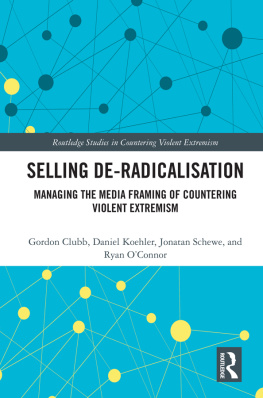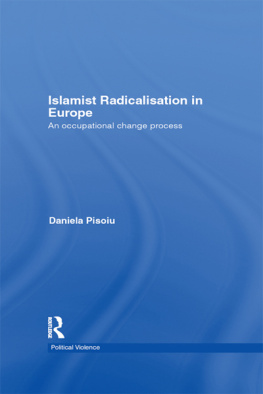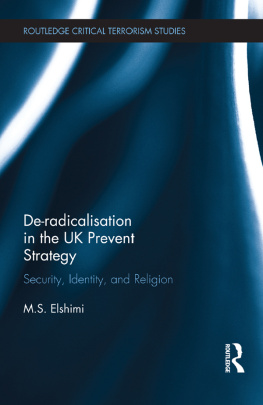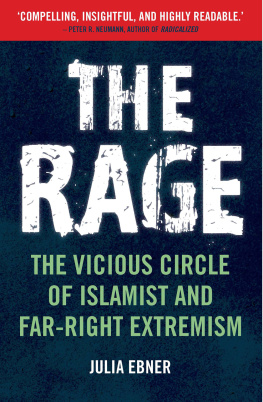Rob Faure Walker - The Emergence of Extremism: Exposing the Violent Discourse and Language of Radicalisation
Here you can read online Rob Faure Walker - The Emergence of Extremism: Exposing the Violent Discourse and Language of Radicalisation full text of the book (entire story) in english for free. Download pdf and epub, get meaning, cover and reviews about this ebook. year: 2021, publisher: Bloomsbury Publishing, genre: Politics. Description of the work, (preface) as well as reviews are available. Best literature library LitArk.com created for fans of good reading and offers a wide selection of genres:
Romance novel
Science fiction
Adventure
Detective
Science
History
Home and family
Prose
Art
Politics
Computer
Non-fiction
Religion
Business
Children
Humor
Choose a favorite category and find really read worthwhile books. Enjoy immersion in the world of imagination, feel the emotions of the characters or learn something new for yourself, make an fascinating discovery.
- Book:The Emergence of Extremism: Exposing the Violent Discourse and Language of Radicalisation
- Author:
- Publisher:Bloomsbury Publishing
- Genre:
- Year:2021
- Rating:5 / 5
- Favourites:Add to favourites
- Your mark:
- 100
- 1
- 2
- 3
- 4
- 5
The Emergence of Extremism: Exposing the Violent Discourse and Language of Radicalisation: summary, description and annotation
We offer to read an annotation, description, summary or preface (depends on what the author of the book "The Emergence of Extremism: Exposing the Violent Discourse and Language of Radicalisation" wrote himself). If you haven't found the necessary information about the book — write in the comments, we will try to find it.
Rob Faure Walker: author's other books
Who wrote The Emergence of Extremism: Exposing the Violent Discourse and Language of Radicalisation? Find out the surname, the name of the author of the book and a list of all author's works by series.
The Emergence of Extremism: Exposing the Violent Discourse and Language of Radicalisation — read online for free the complete book (whole text) full work
Below is the text of the book, divided by pages. System saving the place of the last page read, allows you to conveniently read the book "The Emergence of Extremism: Exposing the Violent Discourse and Language of Radicalisation" online for free, without having to search again every time where you left off. Put a bookmark, and you can go to the page where you finished reading at any time.
Font size:
Interval:
Bookmark:
As one of the authors former students, reading The Emergence of Extremism was a journey of self-discovery. As a Muslim who has been subject to the surveillance of extremism, it enabled me to take myself out of the pre-criminal space and to see the unfair targeting and criminalisation of Muslim students. This book brings to light the way government policy is all too often used to gaslight Muslims in schools, universities and medical settings. The book shows how the emergence of extremism and violence has positioned British Muslims as antithetical to security and preservation of the state. Muslims often find themselves second guessing their theological beliefs as incompatible with the state not because they are, but because policy has left no space for these beliefs without suspicion or scrutiny. The book highlights how counter-terrorism measures that target extremism are doomed to fail. I hope this book can be used as a guide to facilitate reformation of both conversations and policies that uphold counter-extremism measures, as the answer to a question that is in of itself misconstrued.
Munadiah Aftab (Academic, Faith Inspired Activist and former student of the author)
The Emergence of Extremism
ALSO AVAILABLE FROM BLOOMSBURY
Islamic State in Translation , by Balsam Mustafa
Political Economy and Sociolinguistics , by David Block
The Art of Political Storytelling , by Philip Seargeant
The Language of Brexit , by Steve Buckledee
The Emergence of Extremism
Exposing the Violent Discourse and Language of Radicalization
ROB FAURE WALKER

Contents
Bhaskars Transformational Model of Social Activity (TMSA) () |
Collocation of extremism with violent |
Collocation of radicalization with violent |
Collocation of radicalization with violent |
Parliamentary Corpus |
News Corpus (extremism) |
News Corpus (radicalization) |
Hansard Corpus (radicalization) |
Hansard Corpus (extremism) |
Hansard Corpus (extremist) |
Hansard Corpus (pre-crime) |
The semiotic triangle for parliamentary calculus |
Ossified semiotic triangle of parliamentary calculus |
The vicious semiotic triangle of radicalization and extremism |
Bhaskars Transformational Model of Social Activity (TMSA) () |
Utopian Semiotic Triangle for radicalization and extremism |
Semiotic Helix: Bringing time into the semiotic triangle |
The Commission for Countering Extremism at the Building a Stronger Britain Together Conference |
On the morning of Thursday 7 July 2005, I joined millions of other Londoners to take the Underground to work in Central London. Judging by the faces of the other commuters on my train, I wasnt the only one who lacked enthusiasm for the job that I was heading towards. This was my first permanent job after university, and I had already worked out that I was unlikely to ever be enthusiastic about finding jobs for accountants in the recruitment consultancy that I had fallen into to pay the rent. Thankfully, within the next year I would find a job that I was enthusiastic about when I started work as a trainee teacher.
Sitting down at my desk to trawl through CVs, the office filled up around me as my colleagues arrived at work. But, by 9 am when everyone would normally have been at their desks, there were still some empty chairs. Then someone said that there had been a bomb. Twenty-four-hour rolling news soon informed us that there had in fact been three bombs on trains near Aldgate, Edgware Road and Russell Square stations. Shortly afterwards, another bomb would destroy a double-decker bus in Tavistock Square. In less than an hour, Central London had experienced the most devastating bombing campaign since the Blitz.
Like thousands of others across London who had also just arrived at work, I started to phone around to check that my friends and family were safe. Thankfully, everyone who I called that morning did pick up the phone. But, for family and friends of the fifty-two people who had been killed by the bombs, the day would be devastating. Hundreds more had been injured.
As more detailed timelines of the bombers movements have since been published, I have made the same mental calculation over and over again and even find myself doing so sixteen years later as I read accounts of the day (them travelled east on the Circle Line before detonating a bomb and killing seven people between Liverpool Street and Aldgate stations at 8:49 am, and if I also travelled on an eastbound Circle Line train from Kings Cross and got off two stops before Liverpool Street to arrive at work after a short walk just before 9 am, was I on the same train as the bomber? Was I in the same carriage? Was I squeezed up next to him on the crowded train? Were people who I shared my commute with now injured or worse?
I mention this not to propose that I am in any way exceptional, rather to suggest that this was a tragedy that was felt very closely by many people and even by those of us who were fortunate enough to have not lost anyone close to them. With subsequent acts of political violence killing and injuring many more people in the United Kingdom, it is in everyones interest that we have a robust strategy to prevent future death and destruction. Unfortunately, as will be explored in the following chapters, aspects of the United Kingdoms current counter-terrorism strategy appear to achieve quite the opposite. The Prevent Counter-Terrorism Strategy and government efforts to counter extremism seem to promote rather than prevent violence.
Three hours after the first bomb had been detonated, Prime Minister Tony Blair read out a joint statement from the leaders of the G8 countries who he was hosting at the Gleneagles Hotel in Scotland for the annual G8 Summit. The bombings already overshadowed the previous days news that accident-prone President George Bush had collided with a police officer and fallen off his bike (). In his statement, Blair insisted that the terrorists would not impose their extremism on us and the analysis that follows indicates that this marks a discursive shift towards the naming of extremism and extremists as causes of political violence that was not seen in the wake of previous bombing campaigns in London or elsewhere.
Counter-extremism initiatives that seek to prevent future acts of violence have flourished since the London 7/7 bombings and Blairs speech at Gleneagles, yet the common-sense presumption that extreme views and opinions can act as a predictor for future acts of violence is based on a fundamental misunderstanding of the democratic process. Rather than being a predictor for violence, our ability to air supposedly extreme views and be heard prevents us from having to resort to violence. Far from being the defenders of democracy, governments, civil servants and a growing field of well-funded counter-extremism professionals have been seduced by the authoritarian logic that the state should police what people think. Extremism has radicalized them against democracy. This book explores what has caused this to happen and suggests that the supposed radicalization of our politics and the apparently growing problem of extremism can only be resolved if we first abandon the counter-extremism industry.
This will be no easy task as counter-extremism is a global industry. Promoted by the Home Office here in the United Kingdom and the Department of Homeland Security in the United States, counter-extremism has also been promoted around the world. Joint conferences between the UK and other governments to promote counter-extremism are now commonplace (). Having faced extensive criticism for how it is born out of and also catalyses the oppression of Muslims in the United Kingdom and the United States, this global export should be a concern for us all, not least in consideration of the oppression of Muslims around the world. It is hard to see how Western governments can effectively argue for the protection of persecuted Muslims in China, India, Myanmar and elsewhere without first adopting the moral high ground and abandoning their own misguided efforts to counter extremism. As such, while this book focuses on the emergence of extremism in the United Kingdom, it should also act as a warning over the expansion of counter-extremism around the world.
Next pageFont size:
Interval:
Bookmark:
Similar books «The Emergence of Extremism: Exposing the Violent Discourse and Language of Radicalisation»
Look at similar books to The Emergence of Extremism: Exposing the Violent Discourse and Language of Radicalisation. We have selected literature similar in name and meaning in the hope of providing readers with more options to find new, interesting, not yet read works.
Discussion, reviews of the book The Emergence of Extremism: Exposing the Violent Discourse and Language of Radicalisation and just readers' own opinions. Leave your comments, write what you think about the work, its meaning or the main characters. Specify what exactly you liked and what you didn't like, and why you think so.













